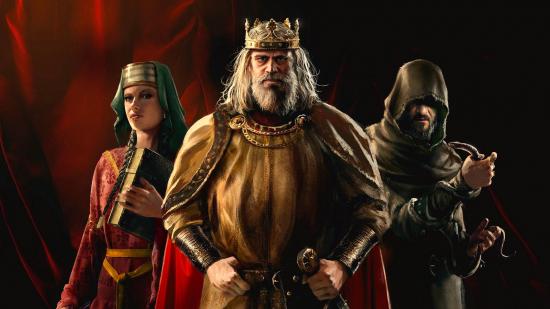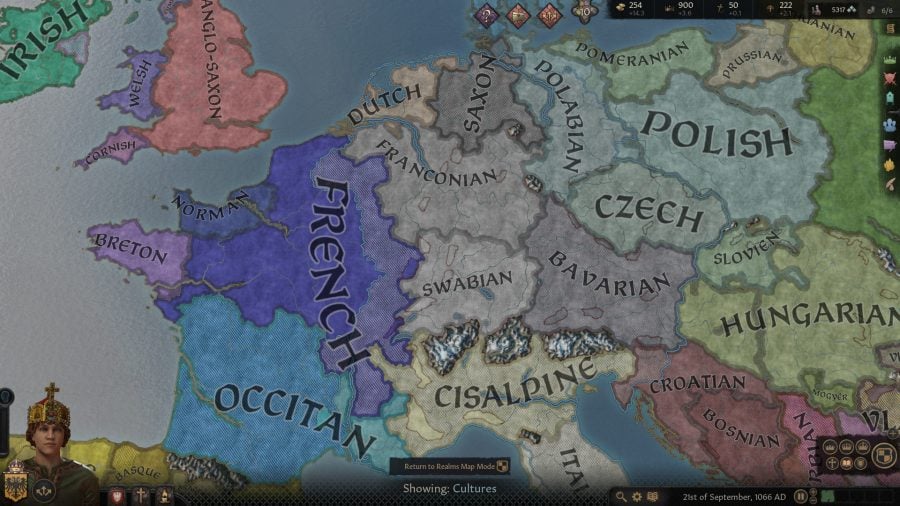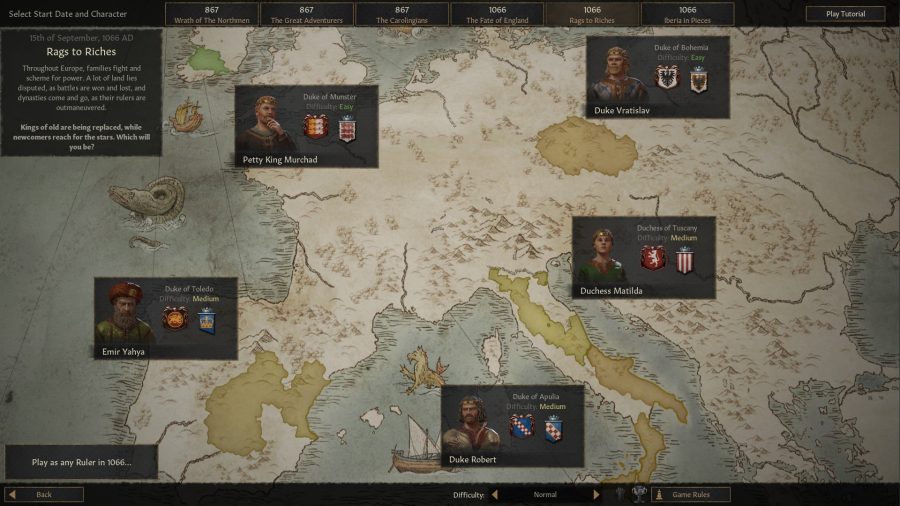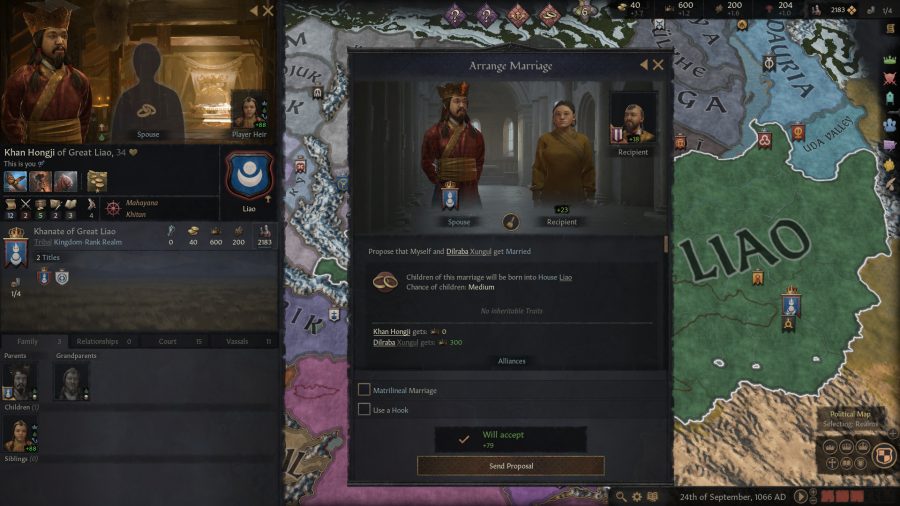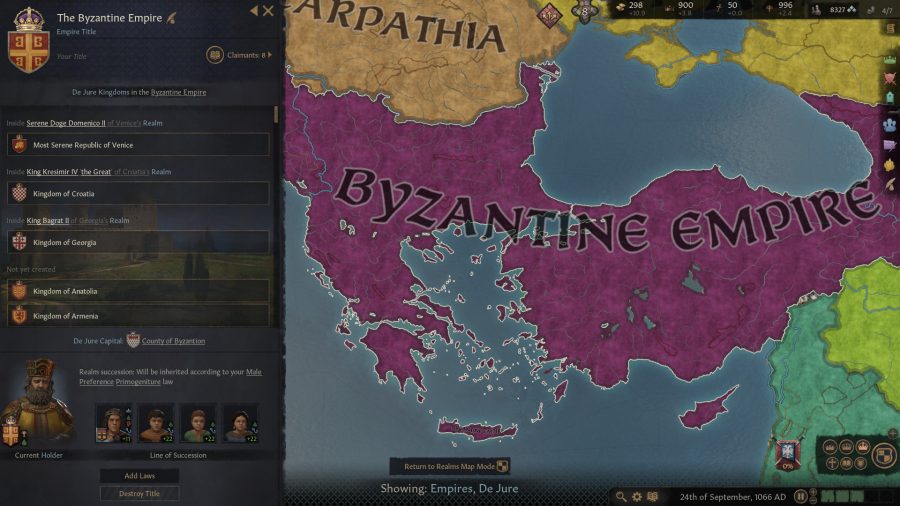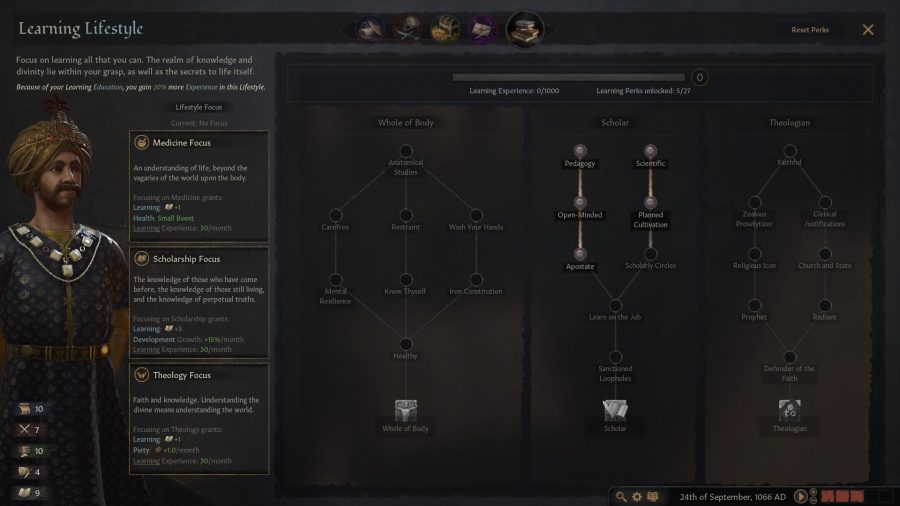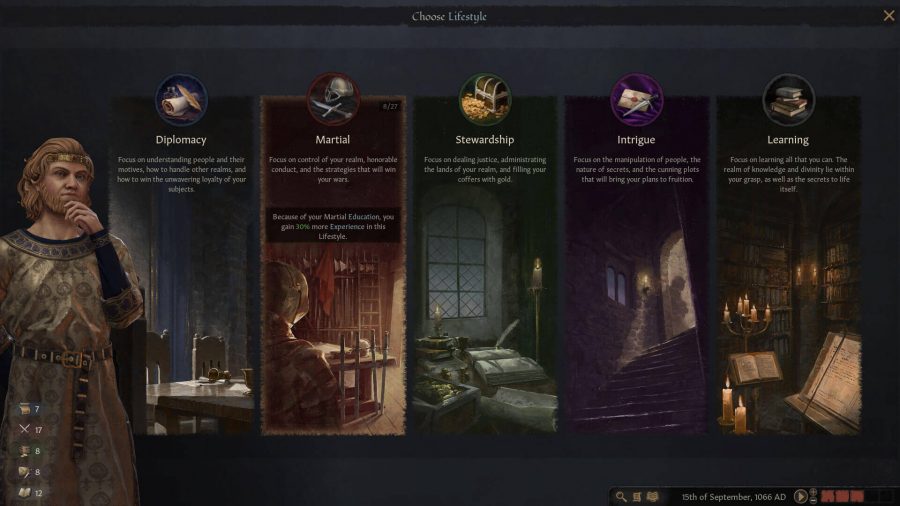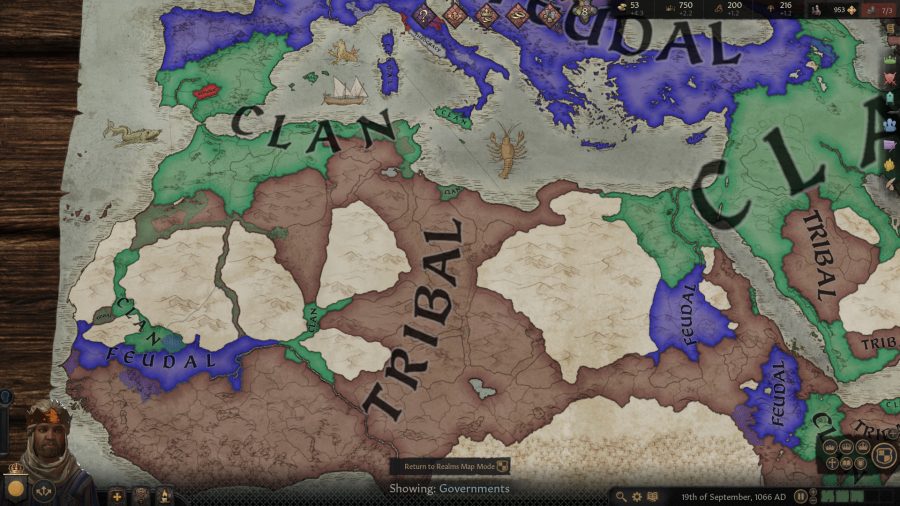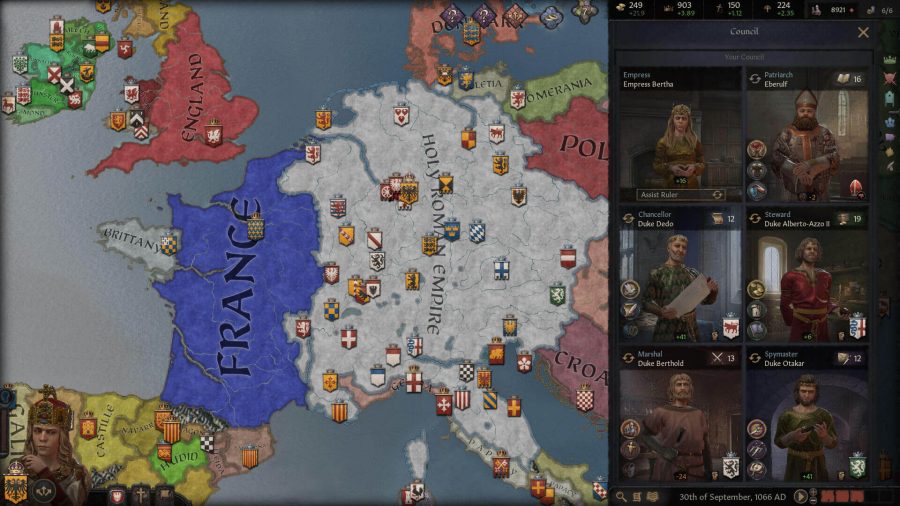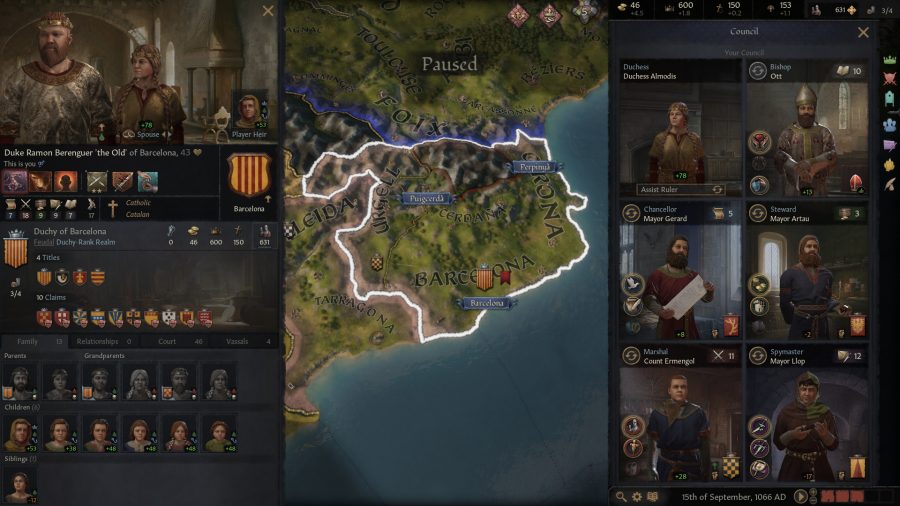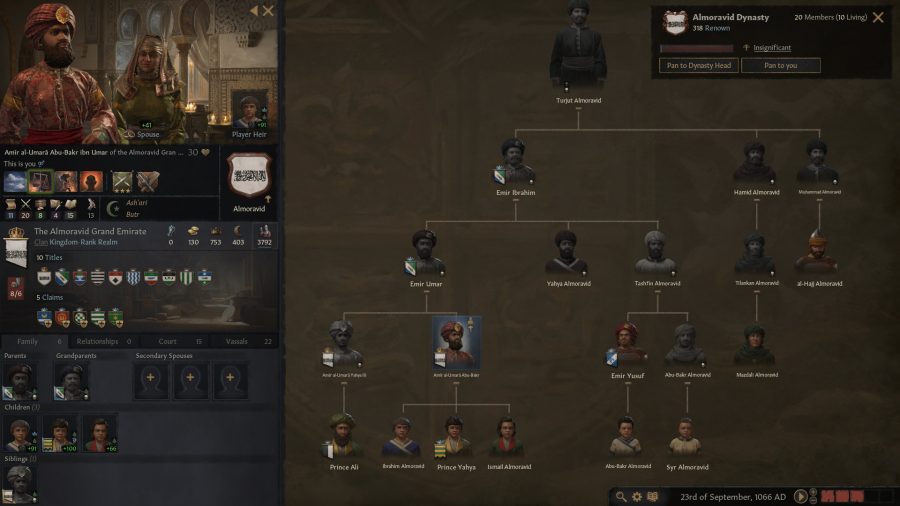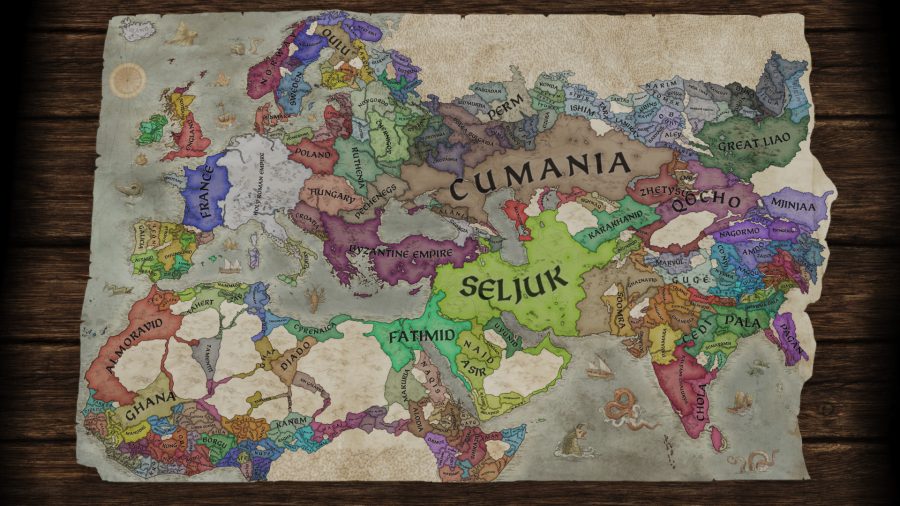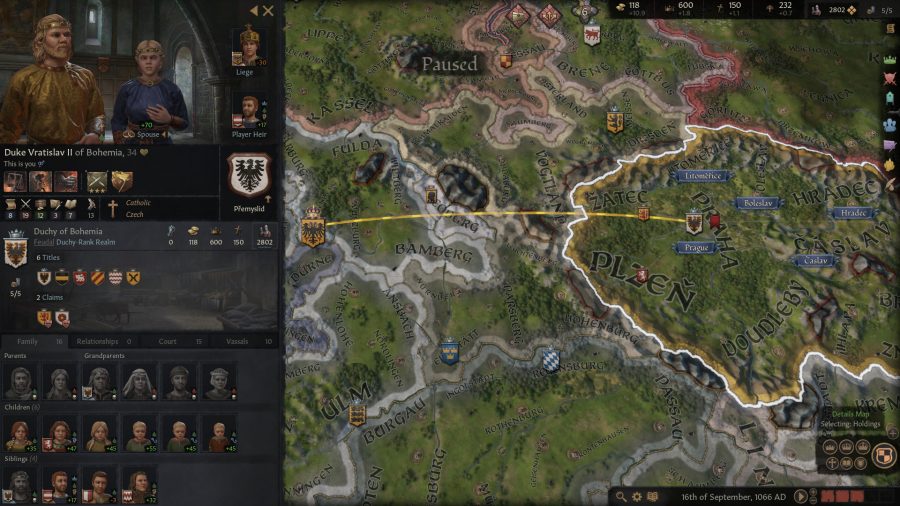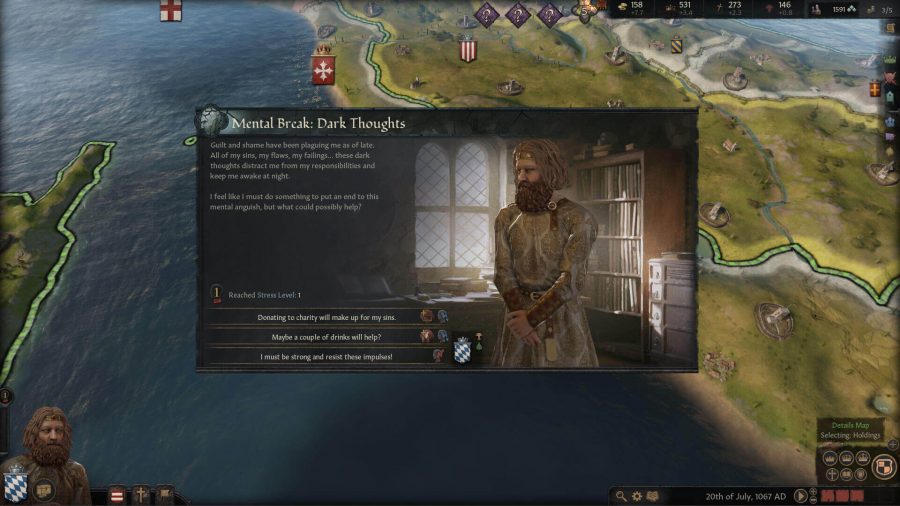Few games appear as overwhelming as Crusader Kings 3. Its sheer freedom of opportunity, scope of play, and reams of nested pop-up menus often intimidate new players before they have a chance to discover the rollicking medieval machinations that lie within. Even old hands at Hearts of Iron 4, or adept nation-builders experienced from thousands of hours sunk into Europa Universalis 4, may become befuddled by the open-ended, character-focused systems of Crusader Kings 3.
But bewilderment is not fitting for a medieval ruler, and should be rectified before your aggressors perceive such hesitation and descend upon you, knives out. We’re here to help with that. Guiding you through the basics of the game, we’ll introduce you to its core systems, while providing advice and explanation on where to begin, player objectives, the operation of characters, the role of councils, how to wage war, and a few final tips.
By the end, you’ll be ready to sit steadfast upon your throne, boasting a firm grasp of the core tenets of statecraft. The game’s systems are complex, and its learning curve steep, but you’ll surprise yourself with how quickly you pick up its core mechanics after a little in-game experimentation.
Contrary to initial appearances, Crusader Kings 3 functions just as much as a roleplaying game as it does a grand strategy affair. Although a sprawling map populated with competing fiefdoms and upstart vassals is at your disposal, you play as the individual, personified ruler of a realm, rather than as a disembodied nation, as in other Paradox titles. Advancing the interests of your ruler is just as important as advancing that of your realm, and often more urgent. Fix this roleplaying-centric approach firmly in your mind, and the rest of the game’s procedures will follow naturally.
So, let’s dive into the world of maniacal monarchs and secretive schemes that is Crusader Kings 3.
Where to start with Crusader Kings 3
You might view the tutorials of most games as laborious chores to pace through as quickly as possible, keen to break free from their insipid explanations and patronising suggestions. But you’d do wrong to dismiss Crusader King 3’s tutorial in the same vein. Guiding you through the game’s core systems in a straightforward starter scenario, mechanics are introduced slowly, while their functions and linkages are explained in ways that can be easily grasped and appreciated.
Handing you control of King Murchard of Munster, and his small duchy in Ireland, you’ll attempt to form a reunited Irish Kingdom, learning the core concepts of conquest, diplomacy, and state control along the way. It won’t teach you everything, and there will be a whole bundle of panels and pop-ups that will make you raise an eyebrow or two, but it makes for an easy introduction into the general motions of the game.
After completion, you can continue playing as good King Murchard in a full campaign, or, if Irish landscapes and religious feuds aren’t to your liking, open up a new game and choose a new ruler to control. While you could pick the first character that catches your eye, or go for a ruler whose name tickles your fancy, it’s best to stick to one with a fairly easy set-up for your first campaign. As tempting as it might be to take hold of the raw military might of the Byzantine Empire, its sheer size is likely to leave you more aggravated than contented, as you struggle to keep afloat among your many detractors, both within and without your supposed borders.
Instead, pick a ruler of a small, stable realm facing few imminent threats, and with diplomatic ties that will protect you from invasion. Duke Vratislav of Bohemia, King Sancho II of Castille, and Duke Robert of Apuila all provide pleasant starting positions, with much opportunity for expansion, but no immediate obstacles that will infuriate your governorship.
Heart of steel: Read our Hearts of Iron 4 tutorial
You’ll also notice that there are two starting years to choose from: 867 and 1066. Determining national boundaries, relationships, and other starting conditions, personal preference will be the main determinant of which era you pick for your first game. Each offers largely the same gameplay, although the early time-period is often more conducive to warring feuds, while the latter makes for a better game of political scheming.
What should you do in Crusader Kings 3?
After carefully selecting a ruler for your first campaign, you’re likely to be a little confused when loading up the game’s sprawling map. What exactly should you do now? Crusader Kings 3 doesn’t have specific objectives for any of its rulers, and there’s no single win state in the game. Instead, the game charges you with overseeing the internal politics and foreign affairs of a medieval realm, moving up the political ladder, gradually improving the lot of your dynasty, and increasing their influence, wealth, and prestige.
Goals arise organically in your playthrough. Set yourself a particular objective – perhaps to invade a neighbouring province or unify a region of fractured states – and you’ll quickly find your focus shifts to other, unanticipated issues, and enticing possibilities. A new diplomatic furore may present itself, forcing you to move all hands on deck as you improve your interpersonal relationships, or your realm may come under attack from an envious competitor, who just so happens to be your uncle that married your wife’s cousin, and hates you because of a religious rivalry that you had all but forgotten about. Political situations come and go, and, as the world around you develops organically, you’ll be tailoring your objectives to coincide with its changes.
But you’ll never be short of things to do. Especially in the early days of your Crusader Kinging, managing your existing realm will be a task in itself, before you start pursuing any broader delusions of grandeur. Set yourself progressively harder challenges, and discover new paths of interest as you play. Eventually, you’ll surprise even yourself as to how large your realm has expanded – or just how quickly it’s been swept away by an uncalculated decision.
Digital dark age: These are the best medieval games
Rather than seeing this as an intimidating prospect, think of it as a relaxing cushion. With no rigorous stopwatches to play against or pre-generated objectives to optimise, you can dictate the pace of the game. Unexpected tragedies and obstacles will present themselves, forcing you to tease a solution through a slick stratagem or two. But even if your ruler /is/ struck down through natural causes, the pointy end of a sword, or the covert cunning of an enemy power, all is not lost; you’ll carry on playing their living heir, and continue to forge your dynasty’s destiny.
What’s all this character stuff?
So you’ve picked a ruler, given yourself a general objective for your first playthrough, and are ready for an invigorating strategy-roleplay medley, but what does it actually mean to play a ruler in Crusader Kings 3? There’s a good few demands (ok, lots of them) to consider when navigating the world of statecraft. Let’s go through some of the prospects you’ll be dealing with from the off.
Managing a medieval realm isn’t all pompous procedure and formal politicking, far from it. Much of your efforts will be spent improving your relationships with other rulers to enhance their opinion of you. Every character in Crusader Kings 3 possesses an opinion of every other character, whether they be an imposing emperor or lowly lord. Look at the small red or green number next to any characters’ portrait to find their assessment of you, and mouse over the number for a list of reasons behind their visceral hatred or genial embrace. Family loyalty, cultural alignment, character skills, traits, and more can influence opinion.
Opinion doesn’t merely drive social relations, but is essential to political decision making. A character’s positive opinion of you will increase the likelihood that your actions and decisions involving them will succeed – such as broaching a trade agreement or sending a marriage proposal – and decrease the chance of conflict erupting between your two nations. Pay particular attention to your vassals’ opinions of you. Should they become disillusioned with your rule, they might try to claim the throne for themselves, inciting a rebellion or terminating your time in office through a covert murder scheme.
A lot of your time playing Crusader Kings 3 will be spent trying to keep people happy, or catering to their happiness while embarking upon other matters of the realm. Keep track of your reliable supporters, but pay greater heed to those you’ve upset. You might have to do them a favour to get them back on your side, even if it risks disrupting the realm.
Total conversion: Check out the best Hearts of Iron 4 mods
Also crucial to your character are their skills. The six skills – diplomacy, martial, stewardship, intrigue, learning, and prowess – represent a character’s expertise in several fields of governorship, and your characters’ ranking in those skills (measured from zero to 100) influences their success rate in any task that requires such a skill, while providing passive bonuses. Diplomacy, for example, will increase others’ opinion of you, while Martial will increase your levy size and reinforcement rate (more on military matters later).
Closely linked is your character’s lifestyle. This can be thought of as your skill specialisation, determining what kind of abilities and state mechanisms you favour.
Each lifestyle corresponds to a skill (besides prowess) and comes with its own perk tree that can be navigated to unlock further buffs for your ruler. Diplomacy focuses on interpersonal and international relationship-building, Martial on military action, Stewardship on acquiring imperial and personal wealth, Intrigue on covert manipulation, and Learning on knowledge and religion. Although these lifestyles, and their corresponding skill buffs, can support your character in particular pursuits, you’re by no means fenced off from others. Call upon all of your skills to muster a truly hegemonic empire.
Other information about your character can be found by clicking their portrait at the bottom left-hand side of the screen. View their domain – that is, the lands under you and your vassals’ control – your family tree, the heir that will inherit your worldly belongings, and list of the various family members, vassals, and courtiers you may interact with.
What’s this council all about?
Ruling a medieval realm is hard work. From the smallest duchy to the grandest empire, decisions are aplenty and troubles brew on every turn. Fortunately, you won’t have to deal with the onslaught of political problems on your lonesome, but can rely on a sagacious council to assist in the running of your realm.
The council is composed of six positions, each focused on a particular area of policy, and its members are assigned by you from the roster of vassals and courtiers within your dominion. It plays an essential management role in your realm, completing tasks that enable you to progress your pursuits, and providing passive support that can ease your rule.
The six council positions are:
- Court Chaplain – Responsible for state religious affairs. Used to develop the faith of your countryfolk, leverage the Church’s support for your actions, and fabricate claims on provinces.
- Chancellor – Oversees diplomatic pursuits. Their efforts may increase others’ opinion of you, both in and outside your realm.
- Steward – Manages taxes, and the development of your realm. They can increase the total gold accrued through tax levels, and promote the culture of your ruler to their poplace, useful for gaining passive compliance in any newly-invaded territories.
- Marshal – Commander-in-chief and responsible for all military affairs. They can influence the capabilities of your army, the size of your levies, the maintenance cost of troops, and root out corruption among your vassals.
- Spymaster – The cunning fiend handling all shady dealings needed to stay afloat as a medieval ruler. They bolster the effectiveness of your schemes, disrupt hostile schemes, and find dirt on other rulers to leverage for influence.
- Spouse – The most flexible of the councillors, your spouse can assist in any of the other five council positions, providing passive benefits, and increasing the skill of your ruler. They provide a boost to existing councillors.
Each member of your council can be assigned to one of three tasks in their respective council position. The speed at which they successfully complete these tasks is determined by their skill in that political area, as well as their opinion of you. Think carefully about your councillor appointments, choosing those who can most efficiently complete their tasks.
Roman Republic: Read our Imperator: Rome 2.0 update review
But sometimes even the best-performing councillors need replacing. Some may die, others may drop in their estimations of you, a few might leave your realm altogether, and, sometimes, you might even have to appoint an incompetent vassal to a prime council position, in an effort to appease them, shoring up their support at the expense of efficient state apparatus.
Waging war
Despite all our talk of wielding calculated political directives to advance your family’s interests and gradually assume the favour of lords and underlings both, a lot of your time in Crusader Kings 3 will be spent expanding your realm through a more expeditious strategy – war.
Warfare in Crusader Kings 3 doesn’t operate with the same gung-ho immediacy as in other strategy games, and you can’t start conflicts wherever and whenever you choose. Abiding by the chivalrous and not at all artificially-constructed or power-entrenching rules of medieval warfare, you may only declare war against an opposing power whose territory you fancy nabbing after drafting a casus belli – a justification for war. If the ‘Declare War’ option on a character’s portrait page is greyed out, you don’t have a legitimate claim to start a conflict and will need to first create a casus belli to engage in conflict.
There’s a few ways of gaining a casus belli. You might have a de jure claim (lawful claim to possess ownership of land) to a territory if another ruler holds a province that has traditionally belonged to your dynasty, or an individual in your court might have a familial claim to it (making the composition of your court doubly important – a new addition might add a convenient new claim for you to exploit, or a loss might push claims outside of your reach). Or, you might entirely fabricate a claim, using your Court Chaplain to dig through the annals of history and tenuously draw some reason why you should be owner of a territory instead of its current ruler.
In any case, declaring war through a casus belli can be an expensive process. It will cost a chunk of prestige, and wars fought on behalf of the Church will require additional piety. Each comes with specific objectives, and only entitles you to conquer territories that fall under its remit. All of this makes warring a prolonged task. Don’t expect to quickly take up arms and march across any neighbouring border that looks attractive; you’re warmongering is limited by procedure.
Upon declaring war, levies (conscripted peasants) will be raised from your existing territories. Holdings will automatically contribute levies for use, but barracks and training grounds can also be constructed to increase the quantity of those raised from each. Eventually, when gold is less tight and war efforts more demanding, look to build men-at-arms regiments, which produce specialised soldiers that brandish superior equipment.
Combat additions: Read our Hearts of Iron 4 DLC guide
Of course, at the head of any great army is a great leader. Each force is assigned a Commander. Be sure to pick one with a high martial skill and any commander traits that grant bonus combat advantages to your troops.
Unlike many other strategy videogames, war isn’t the single, nor primary, system of Crusader Kings 3, and shouldn’t be thought of as its focus. Don’t expand your realm too quickly, spread yourself too thin, or make too numerous enemies too fast. Doing so will leave you vulnerable to avoidable counter attacks, and covert hostile plots.
Final tips
Crusader Kings 3 is undeniably complicated. It presents a lot of information, in lots of systems, using lots of mechanics. Fortunately, the game uses a robust tooltip system to quickly convey information, concisely defining terms and explaining their role and relation to other concepts. Hover your mouse over any blue text to bring up a tooltip explaining the concept. Even better, you can hover over more keywords in that tooltip to bring up additional pop-ups, expanding definitions-upon-definitions, until your screen is full of explanatory musings.
For all the game’s immense scope and endless possibilities, it can be difficult to start your realm-ruling adventure. Analysis paralysis quickly sets in among the many options at your disposal. Be sure to take heed of the advice and issues pop-ups at the top of your screen. If you’ve played other Paradox games, these will be familiar. They represent the latest issues and concerns afflicting your kingdom, tasks requiring attention, decisions needing your deliberation, and advice for progression. Not only serving as useful reminders of small (and often large) details that might be overlooked, they serve as useful short-term objectives, too.
Finally, failure is certain. You will die, wars will be lost, and territory will be ceded. That is fine. Crusader Kings 3 is intended to be played across several in-game generations, and its reward doesn’t come by maximising a single character’s stats or seeing them rise from insignificant provincial Lord to European Emperor, but by building the legacy of their family – through both the good and the bad. Remember, even death isn’t the end. You’ll continue playing as your character’s living heir upon death, or move on to become someone else in their dynasty. Take your time, relax, and enjoy the sheer scope of Crusader Kings 3’s medieval intrigue.
